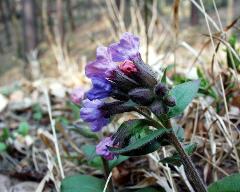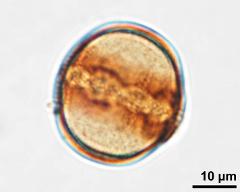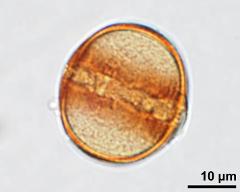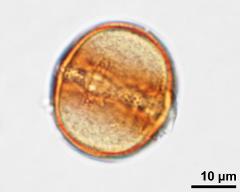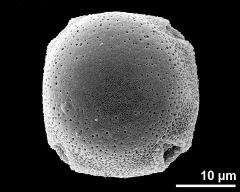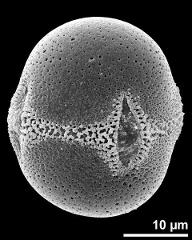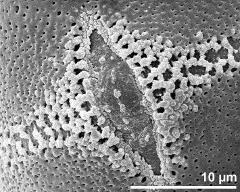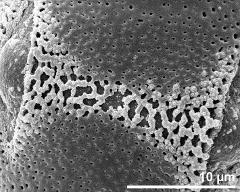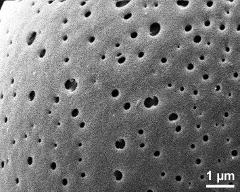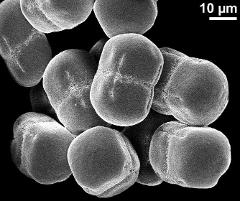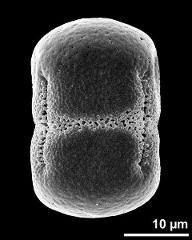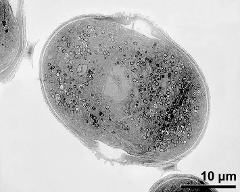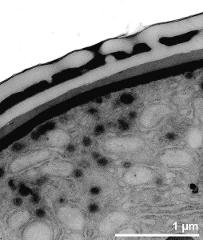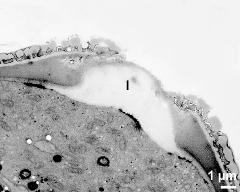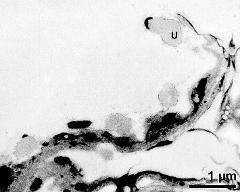Pulmonaria officinalis
Taxonomy: Spermatophyta, Boraginales, Boraginaceae, Pulmonaria
Published: 2005-06-01
Pollen Description
Shape, Size and Aperture
pollen unit: monad, dispersal unit and peculiarities: monad, size (pollen unit): medium-sized (26-50 µm), size of hydrated pollen (LM): -, shortest polar axis in equatorial view (LM): -, longest polar axis in equatorial view (LM): -, shortest diameter in equatorial or polar view (LM): -, longest diameter in equatorial or polar view (LM): -, pollen class: -, polarity: isopolar, P/E-ratio: prolate, shape: -, outline in polar view: quadrangular, dominant orientation (LM): -, P/E-ratio (dry pollen): prolate, shape (dry pollen): -, outline in polar view (dry pollen): quadrangular, infoldings (dry pollen): aperture(s) sunken, aperture number: 4, aperture type: colporus, aperture condition: colporate, aperture peculiarities: -
Ornamentation and Structure
LM ornamentation LM: psilate, nexine: -, sexine: -, SEM ornamentation SEM: perforate, psilate, suprasculpture SEM: -, TEM tectum: eutectate, infratectum: columellate, foot layer: continuous, endexine: compact-continuous, intine: monolayered, wall peculiarities: -, supratectal element: -
Miscellaneous
pollen coatings: pollenkitt, reserves in cytoplasm: -, cell number: 3-celled, Ubisch bodies: present
Annotations: girdle-like equatorial zone with different exine pattern
Author(s) of diagnosis: Weber, M.; Halbritter, H.; Bombosi, P.
Pictures
Picture legend
- flower(s), photographer: Halbritter, H.
- equatorial view, upper focus - dry, acetolyzed, unstained, photographer: Bombosi, P.
- optical section - dry, acetolyzed, unstained, photographer: Bombosi, P.
- equatorial view, lower focus - dry, acetolyzed, unstained, photographer: Bombosi, P.
- polar view - fresh, rehydrated (water) & critical point dried & sputter coated with gold, photographer: Halbritter, H.
- equatorial view - fresh, DMP & critical point dried, photographer: Halbritter, H.
- detail of aperture - fresh, rehydrated (water) & critical point dried & sputter coated with gold, photographer: Halbritter, H.
- detail of interapertural area - fresh, rehydrated (water) & critical point dried & sputter coated with gold, photographer: Halbritter, H.
- exine surface - fresh, rehydrated (water) & critical point dried & sputter coated with gold, photographer: Halbritter, H.
- dry pollen grains - dry, photographer: Halbritter, H.
- dry pollen grain in equatorial view - dry, photographer: Halbritter, H.
- pollen grain in cross section - fresh, glutaraldehyde & osmium & potassium ferrocyanide, uranyl acetate & lead citrate, photographer: Bombosi, P.
- interapertural area of pollen wall, glutaraldehyde & osmium & potassium ferrocyanide, uranyl acetate & lead citrate, photographer: Weber, M.
- apertural area of pollen wall, intine (I) - fresh, glutaraldehyde & osmium & potassium ferrocyanide, modified Thiéry-test, photographer: Bombosi, P.
- Ubisch bodies (U) - fresh, glutaraldehyde & osmium & potassium ferrocyanide, modified Thiéry-test, photographer: Bombosi, P.
Literature
Copyright and Citation
Cite this publication as:
Weber M., Halbritter H., Bombosi P. 2005. Pulmonaria officinalis. In: PalDat - A palynological database. https://pc8.botanik.univie.ac.at/pub/Pulmonaria_officinalis/105701;jsessionid=CE95C315E81530E96057319F3847B974; accessed 2025-07-05

